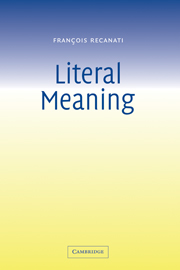Book contents
- Frontmatter
- Contents
- Acknowledgments
- Introduction
- 1 Two approaches to ‘what is said’
- 2 Primary pragmatic processes
- 3 Relevance-theoretic objections
- 4 The Syncretic View
- 5 Non-literal uses
- 6 From Literalism to Contextualism
- 7 Indexicalism and the Binding Fallacy
- 8 Circumstances of evaluation
- 9 Contextualism: how far can we go?
- Conclusion
- Bibliography
- Index
3 - Relevance-theoretic objections
Published online by Cambridge University Press: 08 January 2010
- Frontmatter
- Contents
- Acknowledgments
- Introduction
- 1 Two approaches to ‘what is said’
- 2 Primary pragmatic processes
- 3 Relevance-theoretic objections
- 4 The Syncretic View
- 5 Non-literal uses
- 6 From Literalism to Contextualism
- 7 Indexicalism and the Binding Fallacy
- 8 Circumstances of evaluation
- 9 Contextualism: how far can we go?
- Conclusion
- Bibliography
- Index
Summary
One or two systems?
There is much that is common between the view so far presented and ‘relevance theory’. The emphasis upon the psychological dimension of utterance interpretation, and the rejection of Minimalism, are among the important features that the two frameworks share. But there are also some differences.
One difference that has been recently the focus of attention on the part of relevance theorists is this. According to me, the primary pragmatic processes involved in comprehension are not ‘inferential’. Only when the unreflective, normal process of interpretation yields weird results does a genuine inference process take place whereby we use evidence concerning the speaker's beliefs and intentions to work out what he means. There is no doubt that our ability to do so is an important part of our conversational competence, but the question at issue is: how essential is that inferential ability? Can linguistic communication proceed without it, at some basic level, or is it from the very start constituted by it? Following Millikan and Burge, I reply that communication is not constitutively inferential. As Burge writes,
We seem normally to understand content in a way whose unconscious details (…) are not accessible via ordinary reflection. To be entitled to believe what one is told, one need not understand or be able to justify any transition from perceptual beliefs about words to understanding of and belief in the words' content. One can, of course, come to understand certain inferences from words to contents. Such empirical meta-skills do enrich communication. But they are not indispensable to it.
- Type
- Chapter
- Information
- Literal Meaning , pp. 38 - 50Publisher: Cambridge University PressPrint publication year: 2003

